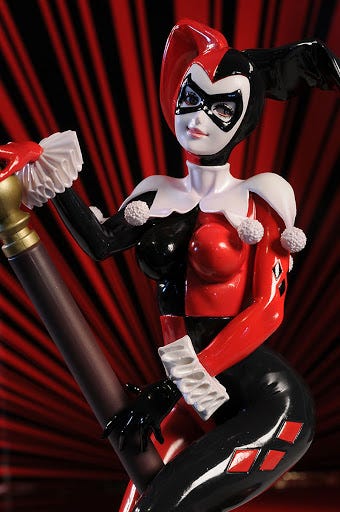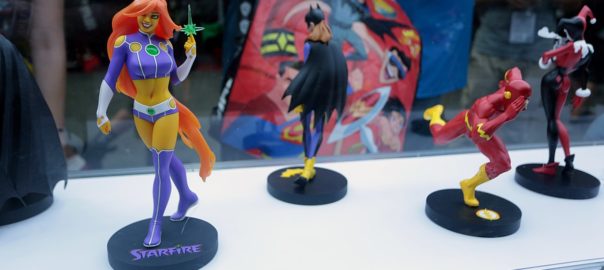By Kent R. Kroeger (NuQum.com, February 20, 2020)
Whenever someone suggests the post-2016 ‘second wave’ of female-led science fiction and superhero franchises are under-performing with audiences, we hear one of three responses from entertainment industry people:
(1) These movies and TV shows aren’t under-performing. Star Wars: The Rise of Skywalker (which centers on the Force-empowered orphan, Rey, portrayed by British actress Daisy Ridley) has made over $1 billion worldwide. How can that be considered a disappointment?
(2) Blame misogynist males. The traditional science fiction and superhero movie audience is still heavily weighted towards males and they are too misogynistic to embrace strong women characters. She-Hulk writer Dana Schwartz even suggests these are mostly nerds seeking revenge over a lack of sex during their teenage and early adulthood years (I hope that isn’t going to be Marvel Studio’s marketing pitch for She-Hulk).
(3) Cherry-picking data. By ignoring the ‘first wave’ female superheroes (Wonder Woman and Captain Marvel), you are throwing out evidence that disproves the original supposition.
All three of these arguments can be genuinely supported and I am certainly aware (from personal experience) that misogyny exists within a segment of the science fiction and comic book movie fan base. But let me offer another hypothesis as to why audiences are not rushing to see TV shows like the CW’s Batwoman, BBC’s Dr. Who, CBS’s Star Trek: Discovery, and HBO’s Watchmen, or movies like Harley Quinn (Birds of Prey), Terminator: Dark Fate, Dark Phoenix and The Rise of Skywalker:
The trauma in Hollywood caused by the 2016 election of Donald Trump opened the door for inferior scripts to get green-lighted after November 2016.
Let me be more direct: To appease their anger over President Pussy-grabber, producers of these aforementioned TV shows and movies have taken a blowtorch to the original source material (some of it undoubtedly created by other pussy-grabbers) and replaced it with depressing, dystopian worlds that alienate original fans and, worse yet, fail to create new ones. Good storytelling has been replaced by incessant moralizing and preachy contempt for half of the potential audience.
If you want to make a better Star Wars-myth than George Lucas’ and have the money to buy the franchise, be my guest. But don’t create a crappy, derivative myth and expect passionate new audiences to magically appear. God knows, Disney will spend the next decade trying to convince parents and their small children that Rey and Kylo Ren are really cool. Good luck.
And I’m not blaming the actors, such as The Rise of Skywalker’s Daisy Ridley, Adam Driver, Oscar Isaac, and John Boyega, who are first-rate at their craft and whose careers should follow a similar arc to Ewan McGregor’s — whose portrayal of Obi-Wan Kenobi in the Star Wars prequels stood far above the mediocre scripts he was paid to regurgitate in front of green screens.
________________________________________________________________
There is a place for social commentary in our movies and TV shows. The best movies and shows have often contained sharp critiques on the human condition: Breaking Bad, All in the Family, M.A.S.H., Citizen Kane, Taxi Driver, To Kill a Mockingbird, and obviously others.
Addressing racism, misogyny, violence against women, or our wide glorification of war should be part of our entertainment consumption — but all of that is for naught if it is not contained within a movie (or TV show) with a good script that is well-acted, directed and produced. Unfortunately, good movies can also be betrayed by their marketing. Message movies still need to attract audiences.
How many moviegoers were estranged by Birds of Prey actor Ewan McGregor, who plays a brutal crime lord in the film, with his gushing dissertation to the movie press about how the movie is about misogyny, including its most subtle forms.
IT’S ABOUT TIME: Ewan McGregor (@mcgregor_ewan) says he was happy to lend himself to a feminist film that “tackled misogyny.” He stars as the antagonist in #BirdsofPrey pic.twitter.com/II5D06q32A
— AP Entertainment (@APEntertainment) January 24, 2020
Ewan McGregor said at the movie’s premiere that he’s “proud to be involved in a film that was a feminist film that tackled misogyny.”
I like the sentiment, I do — but how does that sell the film to a Harley Quinn fan base that significantly over-indexes on horny dudes?
A sentence that has never been spoken: Kids, do you want to see a movie that deconstructs our patriarchal society and confronts explicit and implicit misogyny?
Well, according to Birds of Prey director Cathy Yan and writer Christina Hodson, girls and women starved for movie heroines that take on misogyny will replace those nerds who, as teens and young adults, never touched a woman’s breast, unless you count their hand-painted Harley Quinn statuette.

That audience didn’t show up for Birds of Prey in the numbers Warner Brothers had hoped. In its second week of release, Birds of Prey has earned $153 million worldwide — which may sound respectable — but considering its $100 million production budget, the film will need at least $200 million in box office receipts to break even. At its current pace, the movie will barely turn a small profit for Warner Brothers — which is not what a movie studio wants from one of its big budget films.
What is the number one rule in marketing? Never forget your core audience. Cathy Yan and Christina Hodson created a movie using an established comic book character with a different fan base than the one they were targeting.
Contrast that to Todd Phillip’s The Joker that made over a billion dollars worldwide on a production budget around $70 million. The general rule of thumb in Hollywood is that a movie must make twice its production budget to break even — and for big budget movies like The Rise of Skywalker (with a $275 million production budget) the box office sometimes needs to be three or four times the production budget to be profitable.
Conservatively, The Joker probably made Warner Brothers about $800 in pure profit. Evidence that angry, white males are still over-indulged by Hollywood? Perhaps, but Todd Phillips knew his audience — young males with a well-developed appetite for on-screen violence — and made a movie for them.
You can virtue-signal until your tongue is blue about why Hollywood should stop making films like The Joker and complain that it attracts a subterranean-audience with a behavioral-attitudinal profile we should be trying marginalize, not monetize.
Fine. But financial Hollywood cares more about butts in seats and this recent micro-burst of heroine-centered projects may be transitory if writers, directors and producers don’t start green-lighting better scripts.
________________________________________________________________
More positive examples of what Birds of Prey and other films like it should aspire toward are 2017’s Wonder Woman (Warner Bros.) and 2019’s Captain Marvel (Disney) — both female-directed superhero movies with strong female leads (Gal Gadot as Wonder Woman and Brie Larson as Carol Danvers/Captain Marvel).
Why were those two movies financially and critically successful? Well, if my theory has merit, both films were aided from being in development long before November 8, 2016; in the case of Wonder Woman, the initial script was drafted in 2007.
Neither film was forged under the hot Klieg lights of a Trump presidency that many (most) in Hollywood still consider illegitimate — the mass psychosis, colloquially known as Trump Derangement Syndrome (TDS), did not yet exist.
Instead, Wonder Woman and Captain Marvel are fun, optimistic movies that don’t bury their audiences in grammar-school-level sociology discourses. Even as Warner Brothers and Disney heavily marketed the films as feminist landmarks (for Wonder Woman that made sense), the actual films avoided such pretensions — though Captain Marvel did fall into that trap for brief moments.
Writer and film critic Ben Kuchera says of Wonder Woman: “(Its) a film that is unapologetically sincere and hopeful.”
While promoting the film in the months immediately following Trump’s election, Gal Gadot easily could have fed the prevailing public mood with lectures about female empowerment and the deposing of Hollywood’s stubbornly sexist, patriarchal norms. And, to some extent, she did. But she did something else the actors and producers of Birds of Prey should have learned from — she spoke repeatedly about the inclusiveness of Wonder Woman (Diana), not merely as a feminist icon, but as a human role model.
“We knew we wanted to tell a story that would inspire people: women, men, boys, and girls,” Gadot told Entertainment Weekly before Wonder Woman’s release. Recalling her initial discussions with director Patty Jenkins about her Diana character, Gadot said: “We realized that Diana can still be a normal woman, one with very high values, but still a woman. She can be sensitive. She is smart and independent and emotional. She can be confused. She can lose her confidence. She can have confidence. She is everything. She has a human heart.”
Wonder Woman doesn’t hide her flaws or feel shame for them.
However, the female leads in the latest wave of feminist cinema — Rey Skywalker, Harley Quinn, to name just two — don’t have such vulnerabilities. Even if their back stories contain failures, on film, they always win. Always. Any sign of weakness by a female lead in the Age of Trump is simply unacceptable.
Unfortunately, such two-dimensional characters tend to populate bad movies and TV shows. And, since Donald Trump, more and more of those are filling time on our TVs and movie screens.
- K.R.K.
Send e-cards and comments to: kroeger98@yahoo.com
